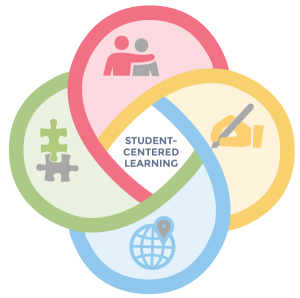Student-Centered Learning (SCL)

Synopsis
SCL is also known as flexible learning, independent learning, open/distance learning, participative learning, or self-managed learning. It focuses on the student’s needs, abilities, interests, and learning styles, with the teacher acting as a facilitator of learning. It puts students first in the teaching and learning pedagogy. SCL requires that students be active, responsible participants in their own learning. Table 1 highlights some useful SCL activities.
| Outside the classroom | In the classroom |
| Independent projects | Buzz groups (short discussion in twos) |
| Group discussion | Pyramids/Snowballing (buzz groups continuing the discussion into larger group) |
| Peer mentoring of other students | Crossovers (mixing students into groups by letter/ number allocations) |
| Debates | Rounds (giving turns to individual students to talk) |
| Field trips | Quizzes |
| Practicals | Writing reflections on learning (3–4 minutes) |
| Reflective diaries, learning journals | Student class presentations |
| Computer-assisted learning | Role playing |
| Projects | Poster presentations |
| Writing newspaper articles | Students producing mind maps in class |
| Portfolio development | |
| PBL | PBL (less complex problems) |
| Case study | Case study (Simpler cases) |
| Modular approach |
In addition to PBL, case study, and modular, PoPBL (Project-Based Problem-Based Learning) other SCL approaches should be taken into consideration (Table 2).
| Other SCL Approaches | Definition of terms |
| Collaborative | Working together to achieve a goal, but in its negative sense it is working as a traitor |
| Contextual | Relating to, dependent on, or using context (e.g., contextual criticism of a book) |
| Cooperative | A business organization owned and operated by a group of individuals for their mutual benefit |
| Constructivist | A theory of knowledge that argues that humans generate knowledge and meaning from an interaction between their experiences and their ideas |
| Inductive | Of, pertaining to, or involving electrical or magnetic induction |
| Experiential | Pertaining to or derived from experience |
| Simulation | The imitation of some real thing, state of affairs, or process; the act of simulating something generally entails representing certain key characteristics or behaviours of a selected physical or abstract system |
Read more:
Training Module Series: Student-Centered Learning (SCL) Approaches for Innovative Teaching by CDAE
